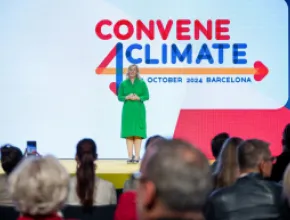You have probably heard the term “greenwashing,” but what is it? Does it require a special detergent? Hot or cold water? Should I separate my greens before washing?
“Greenwashing” is the term used to describe the actions of a company, government or other organization that advertises positive environmental practices while acting in the opposite way.
An example from my own “lessons I have learned” list comes from a meeting several years ago. We asked the convention center if they had recycling. They reported they most certainly did have recycling. During the site inspection, we realized the recycling they had touted was a box next to the photocopier in the sales office. There was no recycling happening anywhere else in the building. Tons and tons of recyclable material were going into the landfill each day.
Another example is the motorcoach company that was working very aggressively to get my endorsement, so I asked them to send me their environmental policies. The firm said they were currently developing them and would get them to me when done. So I asked what makes them a “green alternative.” They said they annually plant trees to offset the carbon released by their fleet of motorcoaches. Knowing that would require A LOT of trees to be planted, I asked how many they planted last year. Their response was that they hadn’t actually started planting trees, but were looking into it. Greenwashing at its finest!
So how can you avoid falling prey to greenwashing?
- Be informed: The first step is to make sure you research your supply chain. What does it mean when your suppliers say they are green? Don’t be afraid to ask about specific practices.
- Understand what terms such as “organic” and “natural” mean. Natural does not necessarily mean healthy—arsenic, uranium and formaldehyde are natural yet poisonous. And as far as non-toxic goes, everything can be toxic, or deadly in sufficient dosages, including oxygen, water and salt.
- Be clear on the criteria used by ecolabels and certifications. The hotel sector has introduced quite a few, such as Green Seal (U.S.), Green Key (Canada) and Green Globe (Europe and Australasia). These are all third-party certifications that look at green operations. LEED certification looks at green construction. When researching ecolabels and certifications, look for those that use clear criteria, adopt third-party verification and report regularly on their environmental performance.
- Participate in a back-of-house tour. This is the most effective way to ensure that vendors who claim to be green are actually operating in a green way. Ask to see the kitchen and areas where waste is sorted. Vendors who are being honest will not be fearful of letting you see what they do.
- Be transparent in your own practices. The risk of greenwashing your own practices is reduced when you are clear and up front about your commitment, intentions and actions.
- Know what you’re buying and what you’re selling. Drill down to make sure green claims can be supported and do not just take them at face value. Taking a few minutes to become informed will save your organization time and money in repairing a tarnished public image from the backlash caused by greenwashing.





